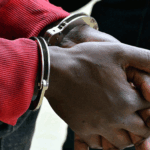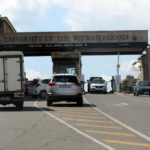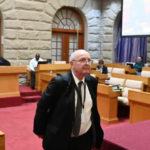The high-profile legal fight over Netflix’s Beauty and the Bester documentary took a dramatic turn on Thursday when it was revealed in court that Nandipha Magudumana, co-accused alongside convicted rapist and murderer Thabo Bester, had already been paid by the streaming giant before trying to stop the broadcast.
Advocate Tembeka Ngcukaitobi SC, appearing for Netflix, told the Gauteng High Court in Pretoria that Magudumana received payment under a commercial licensing agreement for the use of archive material.
“Magudumana was paid for use of archive material, so it is therefore unacceptable for her to turn around at the last minute,” he told the court.
The urgent applications brought separately by Magudumana and Bester to halt the release of the documentary will be decided only 30 minutes before the scheduled broadcast on Friday morning at 09:00. The ruling will be handed down by Judge Sulet Potterill in what has become one of South Africa’s most closely watched media freedom battles.
Licensing Dispute
Advocate Lerato Moela, acting on behalf of Magudumana, argued that Netflix was relying on the licensing agreement as a shield to prevent her client from seeking relief in court.
“The respondents, Storyscope [and] Netflix, rely on the licensing agreement to tell the applicant that if for any reason you have a right [to approach the court], that licensing agreement blocks you from invoking that right,” Moela said.
The contract in question allegedly prevents Magudumana from pre-emptively challenging the documentary, instead limiting her to seeking damages after its release. Moela challenged this, arguing the restriction was unfair.
Ngcukaitobi countered that Magudumana’s legal team was distorting the agreement’s terms. “They seem to suggest that they have a right to veto the documentary. There is no subject who has any entitlement to veto a story about them. Especially a notorious figure. She was invited to comment, and she elected not to,” he argued.
Bester, by contrast, was not a party to any agreement with Netflix. He did not provide archive material, nor was he paid.
Moela also questioned the validity of the contract, saying: “The contract was not signed by the authorised agent.”
But Ngcukaitobi responded that Magudumana had signed “under legal advice” and had already received payment, making the deal binding.
Bester’s Defamation Claim
Running a separate line of attack, Advocate Moafrika wa Maila, representing Bester, warned that the documentary presented serious risks of defamation and prejudice to his client’s fair trial rights.
“Netflix is putting it as a confirmation as if there is a judgment that Bester has escaped from prison. There is no proof. He has never been convicted of that,” Wa Maila told the court.
Referring to statements in the documentary trailer, Wa Maila argued that even a convicted murderer like Bester had the right not to be defamed.
“Anyone can be defamed. We are trying to cap the wildfire that is already burning the image of Bester,” he said.
The defence lawyer questioned the framing of events in the documentary, adding: “There are many ways to come out of prison. It is not always an escape.”
Wa Maila also raised objections to the participation of former Constitutional Court Justice Edwin Cameron, who is interviewed in the documentary and described the case as “the most improbable thing I’ve seen in my life”.
Judicial Findings
Ngcukaitobi, however, maintained that the documentary was firmly grounded in judicial findings and not speculative storytelling.
He pointed to rulings from the Supreme Court of Appeal that detail Bester’s prison break and the subsequent arrest of both Bester and Magudumana in Tanzania. According to court documents, Magudumana had travelled to the country without her passport in an apparent attempt to evade detection.
“It would be absurd to say the media is not repeating findings of guilt. It is repeating the conclusion of judicial officers who were entrusted to look into bail,” Ngcukaitobi told Judge Potterill.
High Stakes Decision
The outcome of the urgent applications will determine whether Netflix can air its much-anticipated series on time. The case has underscored not only the public fascination with the saga of Bester and Magudumana but also the tension between freedom of expression and the rights of accused persons facing trial.
The documentary, produced by Storyscope and distributed globally by Netflix, examines Bester’s daring prison escape, Magudumana’s alleged role in aiding him, and the fallout that followed their arrest in Tanzania.
Both applicants remain behind bars, facing multiple charges, but their legal efforts to control the narrative of their story have now become as much a part of the saga as the criminal trial itself.

Follow Us on Twitter











